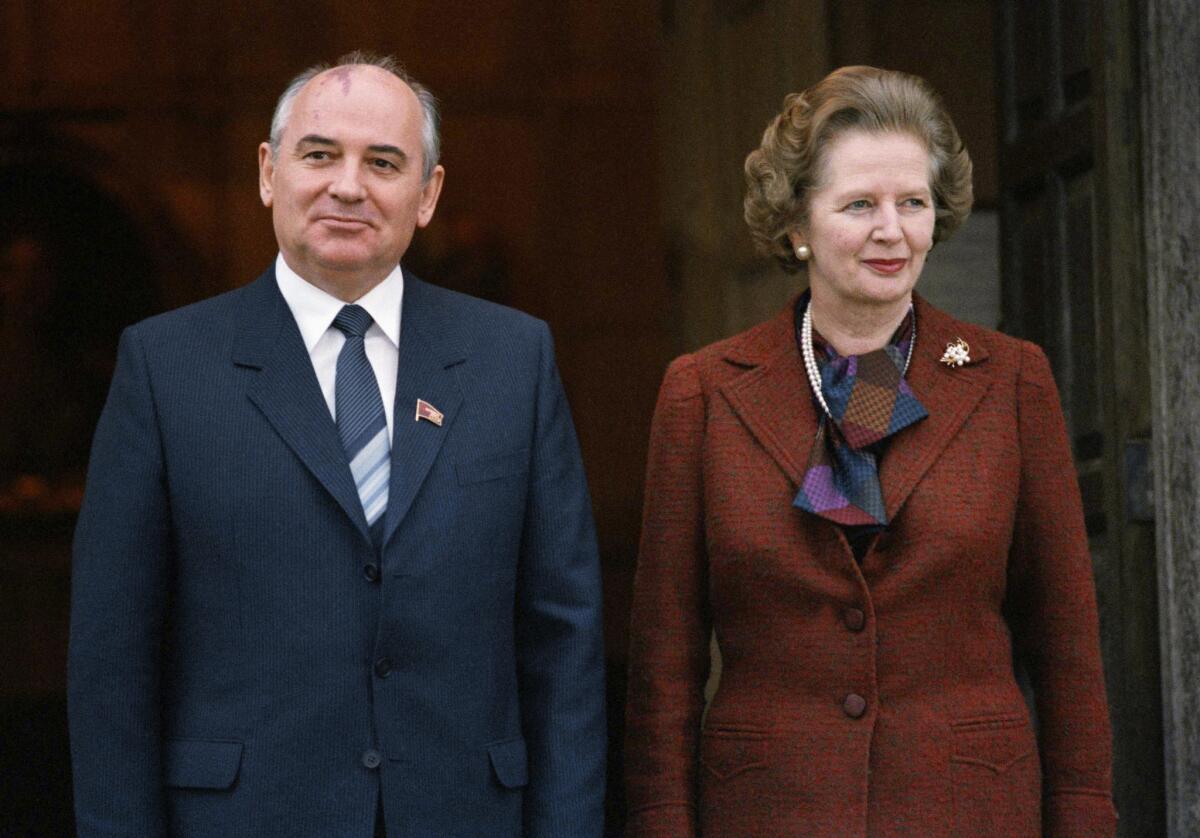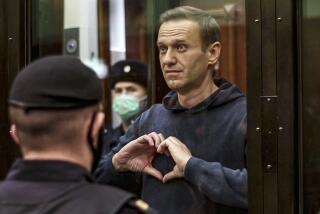First to spot Gorbachev as reformer, Thatcher sped Cold War’s end

Margaret Thatcher will be remembered in her homeland as the conservative “Iron Lady” who transformed Britain from a strife-torn welfare state to a market-driven capitalist bastion. But for many of those who endured Soviet communist dictators and a world on the brink of nuclear peril, her shining accomplishment was being the first Western leader to see hope for a new world order.
Thatcher in 1984 nudged her NATO allies to see in Mikhail S. Gorbachev, then a little-known newcomer to the Soviet Politburo, an opportunity to break out of the mind-set that the Soviet Union would never change.
“We can do business together,” she famously declared after Gorbachev’s inaugural turn on the international stage in December 1984, when he visited Britain and spoke of the need for reform in his country and disarmament worldwide.
A mere three months later, when Gorbachev was elevated to general secretary of the Soviet Communist Party, it was Thatcher who heralded his rise as more than another new face on a failed ideology. She urged President Reagan to give Gorbachev a chance to make good on pledges to stand down from the nuclear face-off and work for a less confrontational relationship between the superpowers.
Anna Vassilieva was a 25-year-old college professor in the Siberian city of Irkutsk when Gorbachev visited Britain, the first high-level Soviet to meet with a British leader in almost three decades. Vassilieva, now teaching Russian history and culture at the Monterey Institute of International Studies, recalled the “wild popularity” Thatcher gained in the Soviet Union after breakthrough talks at the prime minister’s country estate, Chequers.
“She trusted her intuition to see that this was a man she could talk to, that he was of a different generation, not hardened by Stalinism and the whole revolutionary rhetoric,” Vassilieva said of the Thatcher-Gorbachev meeting. “He was a communist, he did believe in socialism, but he wasn’t a revolutionary fanatic. She saw this and she charmed him.”
Images from their cozy fireside chats, when Thatcher was shown slipping off her shoes and curling up in her armchair, were stunning to Soviets accustomed to stiff, protocol-driven exchanges between Eastern and Western officials, Vassilieva said. It shook Soviets out of their own sense that the ideological divide was unbridgeable and that East-West hostilities were a permanent condition.
“It was the start of the most decisive conversation of the 20th century for the destinies of Europe, the United States and the Soviet Union,” Vassilieva said of Thatcher’s embrace of the new Moscow leader.
Those old enough to remember that historic visit still regard Thatcher warmly, Vassilieva said, although their attitudes are deeply resentful toward Gorbachev and the economic and political collapse that his reforms triggered.
Reagan’s first term as president, in the early 1980s, “had been pretty tough on the Soviets, with the ‘Evil Empire’ speech and the very hard-line policy that existed then,” said retired diplomat James F. Collins, a career State Department officer who served as ambassador to post-Soviet Russia.
“Certainly in Washington at that time there was a great split about how to interpret what was happening as Gorbachev came to power in the Soviet Union. There were those who said this means nothing, don’t pay any attention to him, he’s just another communist leader out to destroy the United States. Others, though, were saying, no, there’s something new here, and we need to take a look at what he’s saying to his own people.
“What Thatcher was able to do was validate the idea for Reagan that something was different in the Kremlin, that Gorbachev wasn’t just another [Leonid] Brezhnev or [Yuri] Andropov or [Konstantin] Chernenko, that something was different and something new was happening,” Collins said of Gorbachev’s contrast with his three predecessors in the Kremlin.
Thatcher’s assessment of Gorbachev and her influence with Reagan “played a major role in shaping what happened” in bringing about disarmament treaties and the demise of communist rule in Eastern Europe, said Collins, now head of the Russia and Eurasia Program at the Carnegie Endowment for International Peace.
James Dobbins, another career diplomat now directing Rand Corp.’s International Security and Defense Policy Center, also recalled that “there was for a long time after 1984 considerable skepticism in the U.S. government and intelligence community about how seriously to take Gorbachev’s reform efforts.
“It’s not that they thought he was completely disingenuous, but there was a degree of caution on how much he could revolutionize Soviet society,” Dobbins said. “I think people were initially skeptical about how much he wanted to change and how much he could change even if he wanted to.”
Thatcher’s support for engagement with the Kremlin was an important first step on the path toward an end to the bipolar world, he said. But he sees her later influence with Reagan’s successor in the White House, President George H.W. Bush, as “an obstacle to our diplomacy” in mending the post-Cold War world.
“She was fearful of the reunification of Germany,” Dobbins said. “But to her credit, whether she thought it was good or bad, she saw it as something coming and that it made no sense for her to stand in front of the tide.”
RELATED:
Thatcher funeral to be at St. Paul’s Cathedral
Thatcher critics recall labor battles, Irish strife [Talkback]
Margaret Thatcher, Britain’s first female prime minister, dies at 87
A foreign correspondent for 25 years, Carol J. Williams traveled to and reported from more than 80 countries in Europe, Asia, the Middle East and Latin America.
More to Read
Start your day right
Sign up for Essential California for news, features and recommendations from the L.A. Times and beyond in your inbox six days a week.
You may occasionally receive promotional content from the Los Angeles Times.







